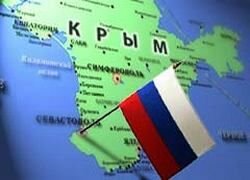
Part 8. "Split"
Part 7. "Separatists Begin and …Lose"
Part 6. "At the Peak of the Fleet-Wide Psychosis"
Part 5 “It Nearly Came to War”
Part 4. “Sevastopol - Crimea – Russia”
Part 3. “How the Black Sea Fleet Was Divided “Fraternally”
Part 2. “Black Sea Fleet on the Scales of Political Tender“
Part 1. “The Russian Federation’s Black Sea Fleet and National Security of Ukraine”
"...The most tense was the situation around the Regiment of the National Guard of Ukraine in Sevastopol, which very much irritated separatists. In this regard, they took all sorts of measures (from provocations to building up a negative public opinion about the Ukrainian troops), trying to make the Ukrainian leadership withdraw the Regiment from the city."
Thus ended the previous part of the material "Crimea 94"
Crimea 9. August, 1994
But the plans of the leaders of the Crimea had a much wider, really geopolitical nature. In late July of 1994, the Supreme Council of the Crimea announced the theses of the “Concept of Inter-Regional Policy of the Republic”. They proposed creation of a so-called economic union "South-East" including Zaporizhzhya, Lugansk, Donetsk and Kharkiv regions. Of course, this association was to be oriented to Russia, establishing close ties with the neighboring Russian regions, as the Crimean Parliament was going to realize Moscow's idea of federalization of Ukraine with further absorption of its regions by Russia.
***
 |
| On July 30, 1994, at the initiative of the RDK – FTS block, in Nakhimov Square in Sevastopol, was provoked holding of the so called "people's council” http://sevrus.narod.ru/ |
Even more aggressive were Sevastopol branches of various pro-Russian organizations. They were actively supported by the Sevastopol City Council. On July 30, 1994, at the initiative of the RDK – FTS block, in Nakhimov Square in Sevastopol, was provoked holding of the so called "people's council”.
Participants of the "Council” supported the Appeal to the Supreme Council of the Crimea, demanding to activate the withdrawal of the Autonomy from Ukraine. In this regard, was prepared a draft of a Decision of the Crimean Parliament, which included the following provisions:
- "Sevastopol is part of Russia";
- "The power of the President of Ukraine in the Crimea is not recognized";
- "Ministry of Internal Affairs, Security Service, Prosecutors, Courts, Customs Service and mass media build their relations with the Crimean authorities in accordance with the Law of the Russian Federation";
- "The state language in Sevastopol is Russian";
- “Teaching at schools and institutes in the Ukrainian language is prohibited";
- "State symbols of Ukraine are replaced by those of Russia";
- “Ukraine's Armed Forces should be withdrawn from Sevastopol”.
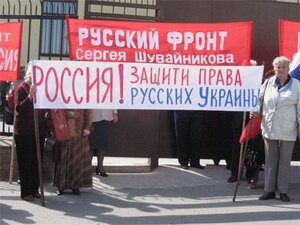 |
| To provide the propaganda aspect of the event, to Sevastopol were brought special, printed in Russia, newspapers "Shuvaynikov’s Russian Party" http://www.nr2.ru/ |
To provide the propaganda aspect of the event, to Sevastopol were brought special, printed in Russia, newspapers "Shuvaynikov’s Russian Party" and "Republic of the Crimea", 3 and 5 thousand copies respectively.
***
In the murky waters of the Crimean politics more and more clearly were visible Russia's economic interests. Thus, despite the Supreme Council of the Crimea Moratorium on the privatization of state property in the Peninsula, the Government of the ARC allowed registration of a closed joint stock company "Yalta Resort", the main shareholders of which became the Ministry of Foreign Affairs of Russia, the Russian State Committee for Television and Radio, as well as the Ministry of Foreign Economic Relations of the Russian Federation.
***
Getting ready to defend Russia’s interests, the Black Sea Fleet continued to build up its Sevastopol group. In early August of 1994, the Commandment of the Black Sea Fleet began to realize plans of relocation to Sevastopol a Tank Battalion from the 126th Division of Coastal Defense. The plans suggested transfer of tanks by trailers from Simferopol to Yevpatoriya, and from there - by large amphibian ships by sea - to Sevastopol.
***
 |
|
Another step in separating the Crimea from Ukraine was opening of the Crimean Interbank Currency Exchange http://www.kmvb.com.ua/ |
Another step in separating the Crimea from Ukraine, was practical implementation of Decrees of the "President" of the Crimea "On Banks and Banking Activity", and "On Currency Regulation in the Republic of the Crimea," in particular, opening of the Crimean Interbank Currency Exchange. At the first auction on the 3d of August, 1994, 738 million Russian roubles were sold . As to Yu.Meshkov, he left for another visit to the Russian capital.
***
Relations between the Government and Parliament of the Crimea were getting more and more tense. On the 5th of August, in Simferopol there was held a meeting of the Crimean Cabinet of Ministers, devoted to this issue. At the meeting it was mentioned that constant absence of Yu.Meshkov because of his numerous tours, significantly weakens the interaction of the executive and legislative branches. In particular, it was mentioned that no one knew about the purpose of the latest visit of the "President" of the Crimea to Moscow. Members of the Crimean Parliament also asked about the reason for absence from the meeting of the Minister of Internal Affairs of the ARC General Kuznetsov.
***
 |
| On August 6, 1994 to the airfield of Saki was moved a sub-unit of the Russian Naval Aviation (front bombers Su-24) http://flot.sevastopol.info/ |
Moscow also continued to strengthen its military presence in the Crimea. On August 6, 1994 to the airfield of Saki was moved a sub-unit of the Russian Naval Aviation (front bombers Su-24, ostensibly for training of pilots of the aircraft carrier "Admiral Gorshkov" (Northern Fleet).
***
Despite Moscow’s support, the Crimean Parliament still had not decided on the direct confrontation with Ukraine. On the August 7th of August, 1994, at the demand of the leadership of Ukraine, deputies of the Supreme Council of the Autonomy canceled the law on dual citizenship for the residents of the Crimea.
Instead, once again was raised the question of forming their own militia of the ARC, which was supposed to enable the Crimean Government to defend their positions in front of Kiev. In accordance with the decision, the Government of the Crimea was instructed to seek additional funds to ensure financing of the Ministry of Internal Affairs of the Republic.
***
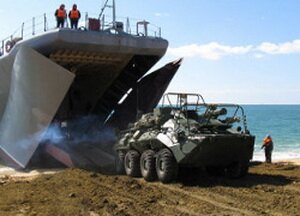 |
|
Loading of КШМ Р-145БМ «Чайка» on board a large landing ship http://www.arms-expo.ru/ |
On the same day, in the village of Novoozerne first 6 tanks T-64 from the 126nd Division of Coastal Defense of the Black Sea Fleet, arrived for further redeployment in Sevastopol. The sub-unit also included 2 BMP-2, a combat vehicle of communication based on the BTR-80, and a truck "Ural".
After short preparations, the equipment was loaded onto landing ships of the Black Sea Fleet.
***
On the 10th of August, 1994 Deputies of the Crimean Parliament returned to the issue of dual citizenship for residents of the Peninsula. At the regular meeting of the Supreme Council was adopted a Resolution "On the Legislative Initiative of the Armed Forces of the Crimea to the Supreme Council of Ukraine about amendments and additions to the Constitution of Ukraine on the issue of dual citizenship in the Republic of the Crimea."
At this, the question was considered by majority of Deputies of the Crimean Parliament, as well as by the leadership of the Crimea, solely as a way to obtain Russian citizenship by ethnic Russian population of the Peninsula. As the Head of the Supreme Council of the Crimea S.Tsekov stated, the parliamentary majority, which represented the "Russia" block, was not going to give up its main goal – the Peninsula’s integration into the Russian Federation.
***
On the 16th of August, 1994 to Sevastopol was delivered the last batch of military equipment from the 127th Separate Tank Battalion of the 126th Division of Coastal Defense of the BSF. Since the beginning of the transfer had been delivered 36 T-64 tanks, 5 БМП-2 (infantry fighting vehicle) and 2 armored tow trucks on their way to strengthen the 810th Marine Brigade of the Black Sea Fleet. Besides, in the Donuzlav point of basing, ready for immediate delivery to Sevastopol, were about 40 БМП-2, and a few БТР(Armoured Personnel Carrier)-80.
***
Despite these circumstances, the process of dividing the Black Sea Fleet was going on. On the 17th of August, 1994 in the course of work of expert groups from Russia and Ukraine, the following parameters of division of the BSF were agreed upon : 669 ships out of 833 had to go to Russia, and 164 – to Ukraine. The subject of the discussion of experts was also the question about the creation of the Russian Naval base in the Crimea and the amount of rent to be paid by Russia for its use.
***
Relying on military force and with the support of the Commandment of the Black Sea Fleet, the leadership of the local authorities of Sevastopol made another political move to withdraw the city from under the jurisdiction of Ukraine, which, according to the idea of organizers, had to be decisive. On August 25,
1994, during an extraordinary Session of the Sevastopol City Council, the decision about the "Russian federal status” of Sevastopol was made. In connection with this, it was proposed immediately to proclaim city Russian, to strip it of Ukrainian symbolism, to raise Russian flags, and to demand withdrawal of Ukraine's Naval units, which were called “occupation” ones. Officers of the Black Sea Fleet of Russia took an active part in the discussion of the issues. In particular, sharply anti-Ukrainian was the speech of the Commander of the Coastal Defense of the Black Sea Fleet, Major-General V.Romanenko, who was a member of the "Russia" group.
Following the example of the Crimean authorities, within the framework of practical realization of their intentions, Deputies of the Sevastopol City Council tried to establish control over the management of the Department of Internal Affairs of Sevastopol. During the Session, they called the Militiamen (Policemen) not to fulfill orders from Kiev, and also demanded subordinate the Department of Internal Affairs to the Sevastopol City Council or to the Ministry of the Internal Affairs of the Crimea. It was also suggested to establish an independent Municipal Militia (Police) of the city. And the Deputies demanded to stop Ukrainian Law working in Sevastopol and to introduce Russian Law in the Peninsula.
***
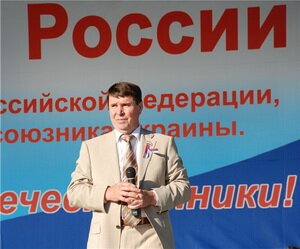 |
|
Sergey Tsekov, "Russians of the Crimea will always be with Russia" http://russ-edin.org |
Resolution of the Sevastopol City Council about the Russian status of Sevastopol sparked heated reactions of pro-Russian organizations of the Crimea, who regarded it as "another victory on the way to integration of the Peninsula into Russia." According to the Deputy Chairman of the Supreme Council of the Crimea V.Mazhak, 79% of the Deputies of the Crimean Parliament approved of the position of local authorities of Sevastopol.
At the same time, against the background of general rise of anti-Ukrainian hysteria in the Crimea and Sevastopol, the Supreme Council of the Autonomy made another attempt to subdue the Department of Internal Affairs of the Peninsula. For this purpose, the Speaker of the Crimean Parliament S.Tsekov sent a telegram to the President of Ukraine, expressing “concern at the worsening of criminal situation in the Crimea”. According to him, the reason for this was in Kiev’s re-subordination of the Law Enforcement Structures of the Crimea. So he asked President of Ukraine to restore the Ministry of Internal Affairs of the Crimea.
Besides, the Crimean Parliament adopted a Resolution "On the legislative initiative of the Supreme Council of the Crimea in the Supreme Council of Ukraine “On Amendments and Additions to Article 131 of the Constitution of Ukraine and the Law on Citizenship of Ukraine ". In that Resolution, the supreme legislative body of the Peninsula asked the Supreme Council of Ukraine to solve the issue of dual citizenship in the Crimea.
***
Beginning of the End
No matter how united the "President" and the Parliament were by the idea of separation of the Peninsula of the Crimea from Ukraine, it did not prevent the sharpening of the conflict between them. Frankly populist promises of Yu.Meshkov were already irritating even representatives of the "Russia" block and other pro-Russian organizations. At the end of August 1994 the Coordinating Council of the Republican Movement of the Crimea harshly criticized the executive branch of power of the Peninsula and refused to continue to support its course. According to representatives of the RCD, Yu.Meshkov and E.Saburov were far away from the "Russia" block and were busy with their political activities and were not going to fulfill their promises given during the election campaign. Moreover, there had been calls to resign the "President" of the Crimea and his "Moscow" Government already in September 1994.
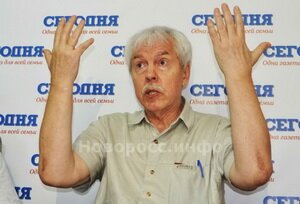 |
| Yu.Meshkov started preparing a referendum on confidence in the Parliament of the Crimea http://novoross.info/ |
In response, Yu.Meshkov started preparing a referendum on confidence in the Parliament of the Crimea, which, in his opinion, had hindered economic reforms on the Peninsula. As the date of the expression of the will was chosen the 10th of September, 1994. However, without waiting for the results of the referendum, Yu.Meshkov’ s administration was preparing a decree on dissolving the Supreme Council of the Crimea. As one can see, both sides tried to get ahead of each other, frantically looking for support of "third forces", in particular – of Communists. They sought that support, but did not find it, and the reason for it was a complete loss of authority by the local Government.
On August 30, 1994 in Yevpatoriya a meeting was held on the occasion of the third anniversary of the banning of the Communist Party of Ukraine. Yu.Meshkov tried to speak, but he was booed by the present, demanding his resignation as well as Ye. Saburov’s.
***
In such a situation, Moscow was still trying to strengthen its political presence in the Peninsula. At the end of August 1994 in Yevpatoriya on the basis of the Russian Party was created a Crimean regional organization of the National Unity Party (NUP), which aimed at “uniting Slavic republics of Russia on the basis of National Socialism”. The headquarters of the Party were in the capital of the Russian Federation.
***
Since the beginning of September 1994 the Supreme Council of the Crimea made a "decisive attack" at the "President" of the Peninsula in an attempt to limit his powers by Law. In particular, the Parliament of the Autonomy invalidated Yu.Meshkov’s Decree "On the Office of the President of the ARC on Security and Inter-State Relations."
Against this background, sociological services of the Crimea continued fixing a sharp decline in the popularity of the "President" of the Crimea, which was due primarily to the fall in living standards on the Peninsula, as well as Yu.Meshkov’s not fulfilling his promises given before the elections. Thus, according to the Crimean Humanities Research Center, at the expiration of 200 days in office, Yu.Meshkov’s rating fell by 30%.
***
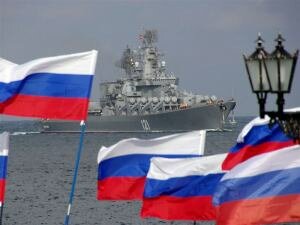 |
| «The Black Sea Fleet of Russia has to extend its presence in Feodosia and Donuzlav» http://sevastopolis.com/ |
In the apparent crisis of the "Russian idea of the Crimea", Russia was trying to preserve its influence at least in Sevastopol, using for this purpose recent decisions of the City Council. In this regard, the primary role was assigned to the Russian military presence in the city - a sort of main "trump card" of Moscow. At this was important the role of the personality of the Commander of the Sevastopol garrison and, above all, his being ready to use military force against Ukraine in case of need. For this purpose, on the 1st of September, 1994 by the Order of the Commander of the Black Sea Fleet to the position of the Commander of the garrison of Sevastopol was appointed distinguished by his intransigent anti-Ukrainian position the Commander of the Black Sea Fleet Coastal Troops, Major-General with the Ukrainian surname V.Romanenko.
***
Due to the known decisions of Sevastopol City Council, increased attention of the Commandment of the Black Sea Fleet was paid to possible actions of Law Enforcement Structures of Ukraine to curb separatists’ attempts to violate the territorial integrity of the state. In particular, on the 7th of September helicopters of the Naval Aviation of the Black Sea Fleet made several flybys of the Headquarters of the Ukrainian Navy, which at that moment were conducting command-and- staff trainings for responding to a crisis situation.
***
These efforts of Moscow were readily supported by the Supreme Council of the Peninsula, which, despite the internal contradictions in the relationship with the executive power, did not stop its active anti-Ukrainian activities. On the 8th of September, 1994 the Crimean Parliament took a decision to ask the state authorities of Russia and Ukraine to grant a Russian status to Sevastopol.
***
Due to the escalation in relations with the Parliament of the Crimea, Yu.Meshkov left for Moscow, where he sought support for his position. There, he presented a plan for settlement of the situation in the Autonomy, which, in his opinion, was very much resembling Russia in 1993.
***
The situation in the Crimea did resemble what was happening in Russia in 1993. In response, the leadership of the Crimean Parliament really tried to remove Yu.Meshkov from power. At a regular Session of the Supreme Council of the Crimea on the 10th of September, 1994 was adopted a draft of “Principles of Bringing the Law about the President of the Crimea into Accordance with the Constitution of the Crimean Autonomy”. The main idea of the document was a significant reduction in powers of Yu.Meshkov, who was supposed to be just a "senior official" and not the Head of a state. Besides, the "President" of the Crimea was deprived of the right to appoint heads of local executive bodies, as well as to hold a referendum on confidence in the Supreme Council of the Crimea.
According to the Speaker of the Crimean Parliament S.Tsekov, the final goal of all these actions was transformation of the Crimean Autonomy into a Parliamentary Republic. He also spoke in favor of the President and chief of the executive power of the Peninsula being elected by the Parliament of the Crimea, to which they should report about their work.
As part of the practical implementation of his plans, S.Tsekov held a meeting with representatives of the Crimean 16 parties, during which was created the Public Advisory Council at the Chairman of the Supreme Council of the Crimea. According to most participants, the Government of the Crimean Autonomous Republic had demonstrated a complete inability to solve the problems of the Peninsula, and thus it had to resign.
***
In response, the "President" of the Crimea Yu.Meshkov on the 11th of September, 1994 issued a Decree "On Termination of the Powers of the Supreme Council of the Crimea and Local Councils," by which he took over the full power on the Peninsula into his hands. He also informed about the plans of his administration to prepare a draft of the new Constitution of the Crimea, which was supposed to be adopted in April 1995 in a referendum. After that, within three months they were going to hold elections for the "People's Assembly" of the Crimea and to form local bodies of self-government.
To back up his actions, Yu.Meshkov, in the spirit of Sailor Zheleznyak of 1917, seized the Parliament building, as well as TV station of the Crimea with loyal to him Militia (Police) forces. Besides, to frighten his opponents, he ordered the Prosecutor of the Crimea, together with the Security Service and the Ministry of the Internal Affairs to check the facts of "splicing of MPs with criminal structures." Of course, who if not the "President" of the Crimea, knew better where to look for those structures.
All this he explained by "assault of the Supreme Council of the Autonomy of his presidential powers, which were given to him by the people of the Crimea." According to the "President" of the Crimea, all this inevitably threatened with serious consequences due to the "loss of controllability of the situation in the Peninsula, the threat of social and political instability, economic chaos, and further increase in crime,"which was fraught with social upheaval and other woes. In these circumstances, Yu.Meshkov "without fear and reproach" would take personal responsibility for maintaining stability in the Crimea.
***
Naturally, the Parliament of the Autonomy was not going to carry out Yu.Meshkov’s orders. On the same day, the Supreme Council of the Crimea held an emergency meeting in the building of the Prosecutor's Office of the Peninsula. As the result, was made a special appeal to the people of the Autonomy. In particular, the orders of the "President" of the ARC on termination of the Crimean Parliament, were interpreted as a "coup." Due to this fact, the Presidium of the Crimean Supreme Council appealed to the Supreme Court of the Autonomy for an assessment of the constitutionality of the actions of Yu.Meshkov. Besides, the Parliament demanded that the Ministry of Internal Affairs of the Crimea should ensure fulfilling the Constitution and Laws of the Republic in the ARC, immediately allow Deputies to work in their office building, to guard means of communications, television and radio broadcasting, as well as to ensure normal functioning of the media. At this, all the blame for the situation on the Peninsula had been assigned to the "President" of the Crimea.
The position of the Parliament of the ARC was supported by the Prosecutor of the Crimea V.Kuptsov. He accused Yu.Meshkov of violation of the Law "On the President," where his right to dissolve the Supreme Council of the Peninsula or to stop its work, was not mentioned.
***
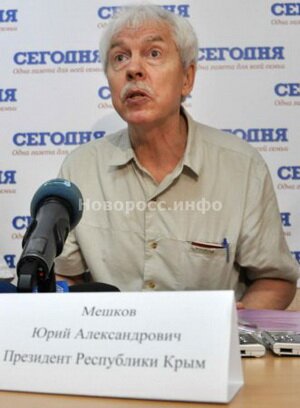 |
| Meshkov, "Nothing will make me stop to defend or to be useful to people." http://novoross.info/ |
In the evening of September 11, 1994, all parties of the conflict met at the negotiation table. Representatives of the Supreme Council suggested that the "President" should unlock the premises of the Parliament, and then hold there a meeting to find ways out of the crisis. The "President" of the Crimea refused to negotiate with Deputies. According to S.Tsekov, judging by the behavior of Yu.Meshkov, he deliberately was provoking worsening of the situation in the Crimea.
***
Characteristically, in the context of the conflict both sides were looking for support from Ukraine, from which they were trying to get separated all the time. Both, Yu.Meshkov and S.Tsekov addressed President of Ukraine for help in solving their problems in their struggle for power.
***
Due to the sharpening of the situation in the Peninsula, President of Ukraine called both sides to find a civilized solution to the problem within the framework of the Constitution and Laws of the Crimea.
In turn, the Law Enforcement Structures of Ukraine in the Crimea were given an order: under any circumstances, not to use violence, which would threaten life and health of citizens.
***
The situation in the Crimea was actively used by Communists to restore their eroded rating. Commenting on the developments in their usual manner, the Republican Committee of the Communist Party of the Crimea determined that the goal of Meshkov’s Decrees was ".. to try to remove people from governing the state, as well as to create conditions for uncontrolled privatization of state property," which, according to the Communists, "... had to necessarily lead to a sharp destabilization of the socio-political and criminal situation in the Crimea. " In this regard, Communists demanded a full restoration of the Constitution of the Crimea, an immediate adoption of the Law on local bodies of government, as well as an immediate holding of elections.
***
Other pro-Russian Crimean organizations of all sorts were also actively seeking power. In the course of the 2nd Congress of the Russian Party of the Crimea was formed a so-called "shadow government" of the ARC. At the same time, according to the leader of the movement S.Shuvaynikov, the situation in the Crimea was becoming increasingly "revolutionary ". At the same time, the Political Council of the party declared undesirable participation in reelections to the Supreme Council of Ukraine, because it was contrary to the Party’s main course: Crimea’s getting independence from Ukraine.
***
Paying no attention whatsoever to the resistance of the Supreme Council of the Crimea, Yu.Meshkov continued to stick to his line. Ignoring the negotiations with the Parliament of the Peninsula, he was trying to attract broad masses of the Crimean people to his side. For this purpose, on the 13th of September, 1994 near the building of the Crimean Supreme Council was organized another meeting in support of the "President" of the Autonomy.
Speaking at the walls of the Parliament, Yu.Meshkov once again accused the Supreme Council of the Crimea of an attempt to remove him from power, which, according to the "President", sharpened the situation in the Peninsula. However, he said he was ready to negotiate with the legislative authority of the Peninsula. But at the condition of restoring the situation as it had been before the decision of the Crimean Parliament to limit his powers. As a "compensation", Yu.Meshkov ordered to unblock the building of the Parliament of the Peninsula.
***
On the same day the Presidium of the Supreme Council of the Crimea adopted a Decree “On the Establishment of a Commission to Investigate the Events of the
11-13th September 1994”. Had been heard speeches on questions of “On a Government of the Crimea" and of "Internal Protection of the Building of the Supreme Council".
The Deputies discussed the terms of the adoption of the "zero" variant of resolving the Constitutional crisis in the Crimea, which resulted in a decision in which this option was considered only in terms of possible cancelling by the "President" of the Crimea Yu.Meshkov his Decrees, without canceling orders of the Supreme Council of the Autonomy.
***
Taking into consideration these positions of the parties, which were creating real preconditions for further development of the conflict, President of Ukraine made an appeal to the leadership of the Autonomy, calling to stop struggle for power immediately. Otherwise Kiev promised to take appropriate measures.
To the state of high combat readiness were brought units of the Ukrainian Militia (Police) in Simferopol and other cities of the Crimea, where they were dislocated in such a way, that could avoid clashes between the supporters of the "President" and of the Parliament of the Peninsula.
***
Because of the situation in the Crimea, the Black Sea Fleet Commandment was at a complete loss. Under the circumstances of a sharp conflict between the pro-Russian forces of the Crimea, it could not decide, which side should be supported. It seemed that the situation was somewhat unpredictably going out of control.
Eventually all this had led to a sharp fall of Yu.Meshkov and the Supreme Council of the Crimea’s authority at the Black Sea Fleet. They believed in the BSF, that neither the "President" of the Crimea, nor the Parliament of the Autonomy could integrate the Peninsula into Russia. Eventually it was decided to announce the formal neutrality of the Fleet, and so the Press Center of the Fleet did.
But the Commandment of the Russian Black Sea Fleet did again try to use the Crimean situation to its advantage. In the chaos of the political turmoil was made another attempt to tear away from Ukraine at least Sevastopol. To do this, Commander of the Coastal Defense of the BSF, Major General V.Romanenko got actively involved in the preparations of the extraordinary Session of the City Council of Sevastopol, which was supposed to discuss practical steps to confirm the "Russian status" of the city. By such steps were meant termination of working of Ukrainian Laws in Sevastopol and introduction of Russian Law, the subordination of city Militia (Police) to the Sevastopol City Council, replacing of the Ukrainian symbols in the city with the Russian ones.
At this, as said V.Romanenko, a part of Marines of the BSF was ready to assume the "function of maintaining order in Sevastopol."
***
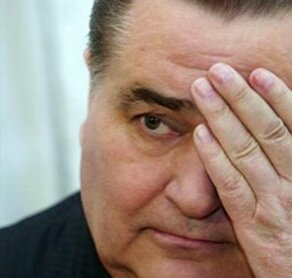 |
| Ye. Marchuk, "The Black Sea Fleet of the RF in the Crimea under neutrality- its an absurd" http://mignews.com.ua/ |
On the 15th of September in the Crimea with the mediation mission arrived Deputy Prime Minister of Ukraine Ye. Marchuk to participate in the negotiations between the "President" of the Autonomy Yu.Meshkov and members of the Parliament of the Autonomous Republic. The aim of these talks was to reach a mutually acceptable compromise between the parties through the 'zero option'.
***
Despite the declared neutrality, the Commandment of the Black Sea Fleet extremely irritably perceived the demand of the political leadership of Ukraine to the "President" of the Crimean Peninsula Yu.Meshkov and Parliament to coordinate all legislation acts of the Autonomy with Ukrainian Law. At this, confrontation between the branches of the power in the Peninsula was estimated as a "blow to the unity of pro-Russian forces which had been fighting for the Crimea’s disintegration from Ukraine, as well as for the preservation of a sole Russian Black Sea Fleet."
At the same time began preparations for the next large-scale Naval trainings, scheduled for the second half of September 1994.
***
On the 16th of September a Session of the Supreme Council of the Crimea approved of the Government's Decision "On the Establishment of a Commission to Investigate Anti-Constitutional Actions that Took Place from 11 to 13 September 1994." The Commission, headed by the Deputy Chairman of the Supreme Council of the ARC V.Mezhak, received broad powers to interrogate people connected with those events. By another Decree of the Supreme Council of the Crimea was recognized as invalid the Decree of the "President" of the Crimea Yu.Meshkov "On the Appointment of Heads of bodies of state executive power in the regions and cities of the Crimea”. The Supreme Council of the Crimea also expressed absence of confidence in the Cabinet of Ministers of the Autonomy and demanded its resignation. According to S.Tsekov, the then current Crimean Government had not solved a single problem that the Crimea had faced.
Decisions on invalidity of Yu.Meshkov’s Decrees were being taken at a lower level too, in particular, by local Councils of Feodosiya and Krasnoperekopsk.
***
In response Yu.Meshkov said he was ready to defend his Government, as his resignation "will give an irreparable blow to the economy of the Peninsula." At the same time, giving the weight to his position, he said that he kept a constant contact with President of Ukraine.
On the 11th of September, 1994 against Yu.Meshkov spoke even his closest supporters from Simferopol organization of the Republican Party of the Crimea, which he had been heading till his election as “President”. They accused him of failing to fulfill his election campaign promises and of his stepping aside from the program of the Party.
***
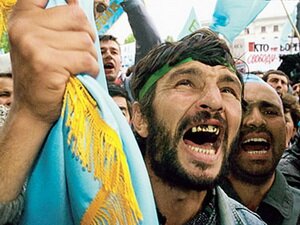 |
| Traditionally, against Yu.Meshkov spoke also the Majlis of the Crimean Tatars http://lenta-ua.net/ |
Traditionally, against Yu.Meshkov spoke also the Majlis of the Crimean Tatars. In their appeal they criticized the political course of the "President" and the Supreme Council of the Crimea, which had endangered the civil harmony in the Peninsula. The Tatars named the following reasons for the crisis: overreliance of the "President" and the Supreme Council of the Crimea on political issues of relations with Ukraine; ignoring completely economic problems of the Peninsula; inconsistency of Autonomy’s Laws to those of Ukraine, as well as the desire of Crimean authorities to violate the territorial integrity of Ukraine.
***
On the 18th of September Special Representative of President of Ukraine in the Crimea Marchuk met with the "President" of the Autonomy Yu.Meshkov and the Head of the Supreme Council of the Crimea S.Tsekov. Representatives of the Crimean government were once again asked to solve the problems in peaceful, Constitutional way. However, they did not want to give up their principles.
Most of the Deputies of the Crimean Parliament kept insisting on further investigation of Yu.Meshkov’s Anti-Constitutional actions in the period of 11-13th September, 1994. In his turn, the "President" of the Crimea strongly objected to it and refused to dismiss his Government, headed by Ye. Saburov. At the same time, in order to keep power in his hands, he proposed to create a so-called "technical government" out of representatives of non-party members experts who did not need to be adopted by the Supreme Council of the Crimea. By this Yu.Meshkov tried to delay the appointment of a permanent government at least until next spring.

